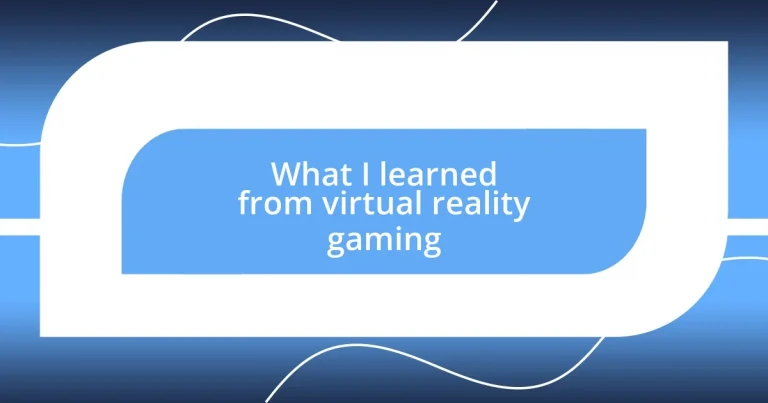Key takeaways:
- Virtual reality gaming enhances cognitive functions, social connections, and can serve therapeutic purposes, highlighting its benefits beyond entertainment.
- Gaming develops valuable skills such as hand-eye coordination, strategic thinking, teamwork, and adaptability, which can be applied in real-life situations.
- The future of VR gaming promises personalized experiences and enhanced social interactions, potentially redefining entertainment and learning.
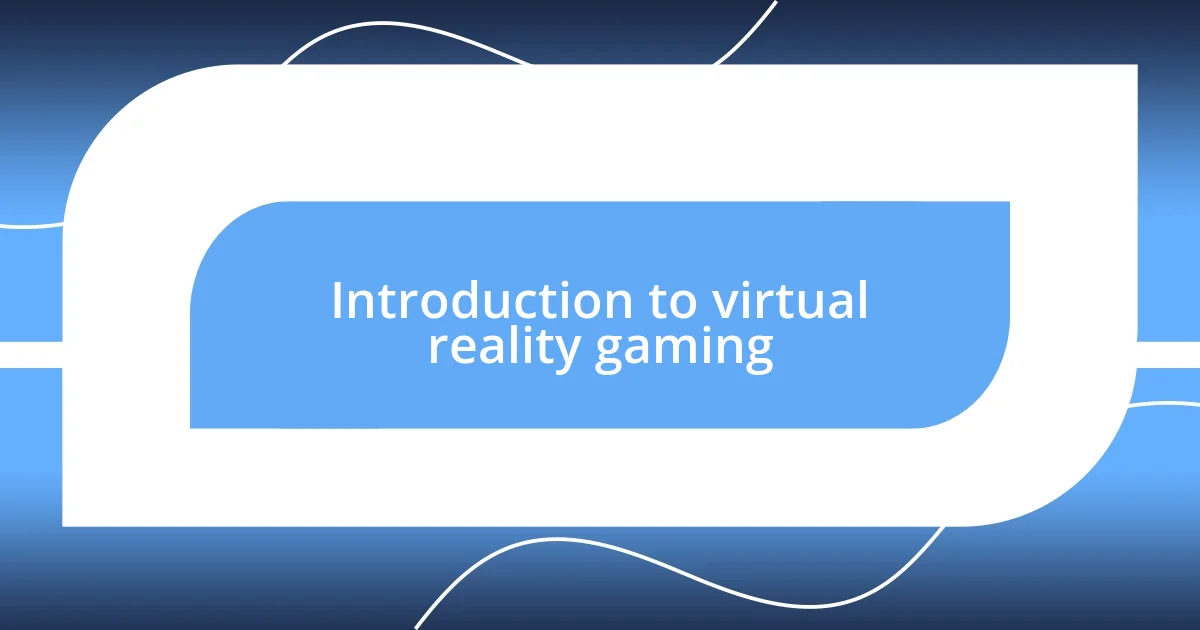
Introduction to virtual reality gaming
Virtual reality gaming is not just a trend; it’s an immersive experience that transports players into entirely different worlds. I remember the first time I slipped on a VR headset — the moment I entered that digital realm felt surreal. I could actually reach out and touch things that didn’t exist in the physical world, which left me wondering: How could something so fantastical feel so real?
As I navigated through these models, I found myself experiencing emotions and sensations that were deeply engaging. I felt the adrenaline rush during thrilling chases and the heartwarming connection with characters that seemed almost alive. Have you ever found your heart racing while being chased by a digital dragon? It’s a reminder that within the code lies a powerful tool for storytelling and emotional connection.
The technology behind virtual reality has advanced rapidly, evolving from rudimentary experiences to richly detailed environments that captivate the senses. With each new game that I explored, I realized that VR not only entertains but also challenges our perceptions of reality. It’s fascinating to think about how this technology might evolve in the future and what new adventures await us, inviting us to ponder: What else can VR teach us about ourselves and the worlds we inhabit?
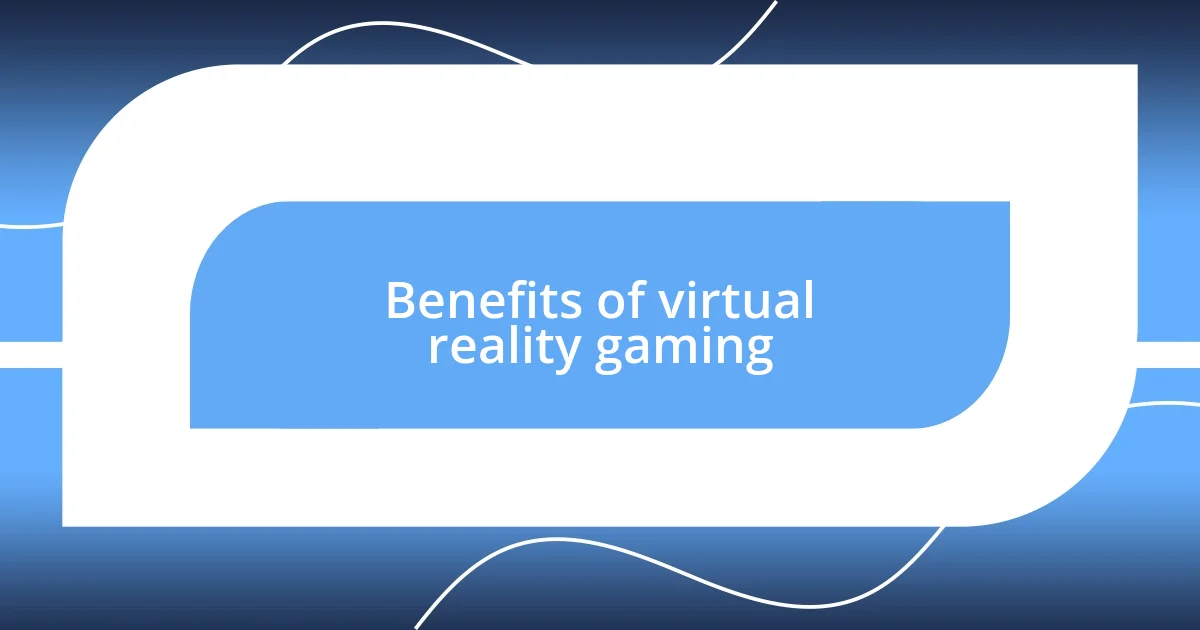
Benefits of virtual reality gaming
Virtual reality gaming offers a variety of benefits that extend beyond mere entertainment. One of the most significant advantages I’ve discovered is its ability to improve cognitive functions, like problem-solving and spatial awareness. For example, while navigating through a complex puzzle in a sci-fi universe, I found myself strategizing and adapting in real-time, which sharpened my mind and boosted my critical thinking skills. Have you ever had one of those moments where a game made you feel smarter?
Moreover, the immersive nature of VR can foster social connections. Instead of playing alone, I often join friends in virtual environments, where we share experiences and collaborate to overcome challenges. It’s fascinating how we can laugh, chat, and bond while walking through a fantastical landscape, replicating that real-world connection—even though we might be miles apart. Isn’t it refreshing to think that technology can bring us closer together?
Interestingly, VR can also serve therapeutic purposes. I recently learned about its use in managing anxiety through calming virtual spaces. Experiencing a serene beach setting while practicing mindfulness exercises was profoundly relaxing. It highlighted how gaming can transcend entertainment and become a tool for mental well-being. It’s a hopeful reminder of the unexpected paths gaming can pave for us.
| Benefit | Description |
|---|---|
| Cognitive Improvement | Enhances problem-solving and spatial awareness through interactive challenges. |
| Social Connection | Fosters friendships and collaboration in shared virtual environments. |
| Therapeutic Use | Utilizes calming virtual spaces for mental health and anxiety management. |
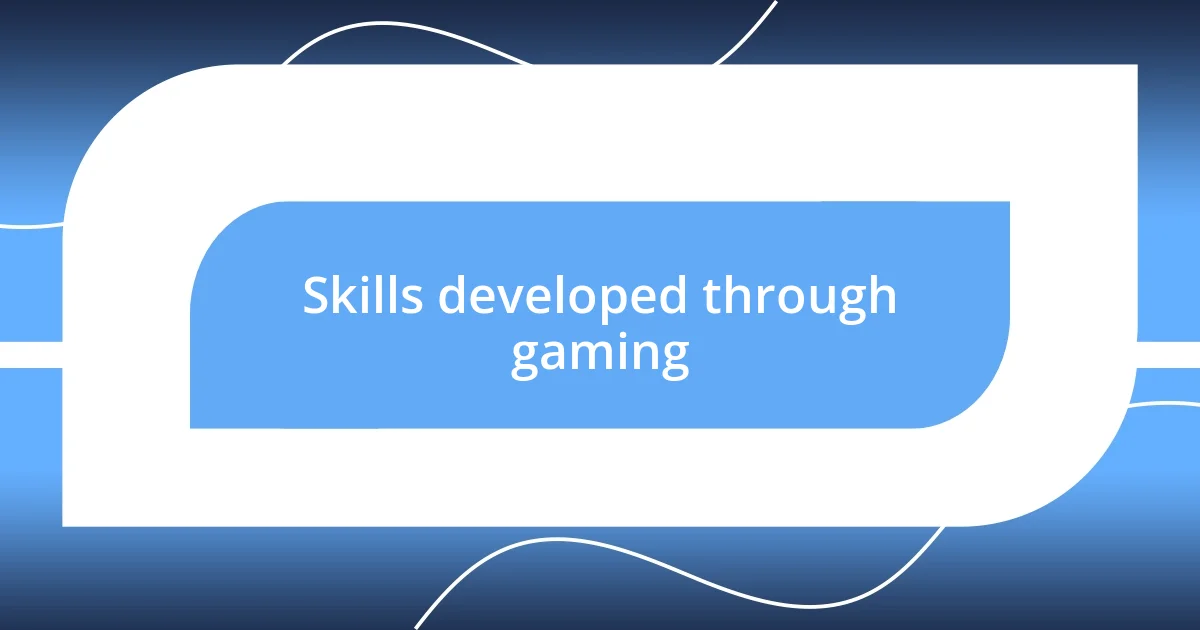
Skills developed through gaming
Gaming, especially in virtual reality, has a remarkable knack for developing a variety of skills that might surprise you. One time, while immersed in a VR combat game, I realized just how much my hand-eye coordination was improving. I had to react instantly to incoming threats, leading to a noticeable boost in my reflexes. This immersive experience took my gaming to a whole new level, and I could see those skills translating to real-life activities, like sports or even driving.
Here are some key skills you can develop through gaming:
- Hand-Eye Coordination: Complex movements require precise timing and control, improving physical coordination.
- Strategic Thinking: Many games force you to plan several moves ahead, enhancing your ability to think critically.
- Teamwork: Collaborative gaming experiences develop communication and cooperation skills as you work toward a common goal.
- Adaptability: Rapidly changing game environments encourage flexibility and quick decision-making.
In my experience, these skills don’t just stay within the confines of gaming; they spill over into everyday life. One time, I started applying my strategic thinking from gaming to manage my time better in my work projects, resulting in increased productivity. It’s inspiring to see how something meant for fun can lead to such meaningful skill development.
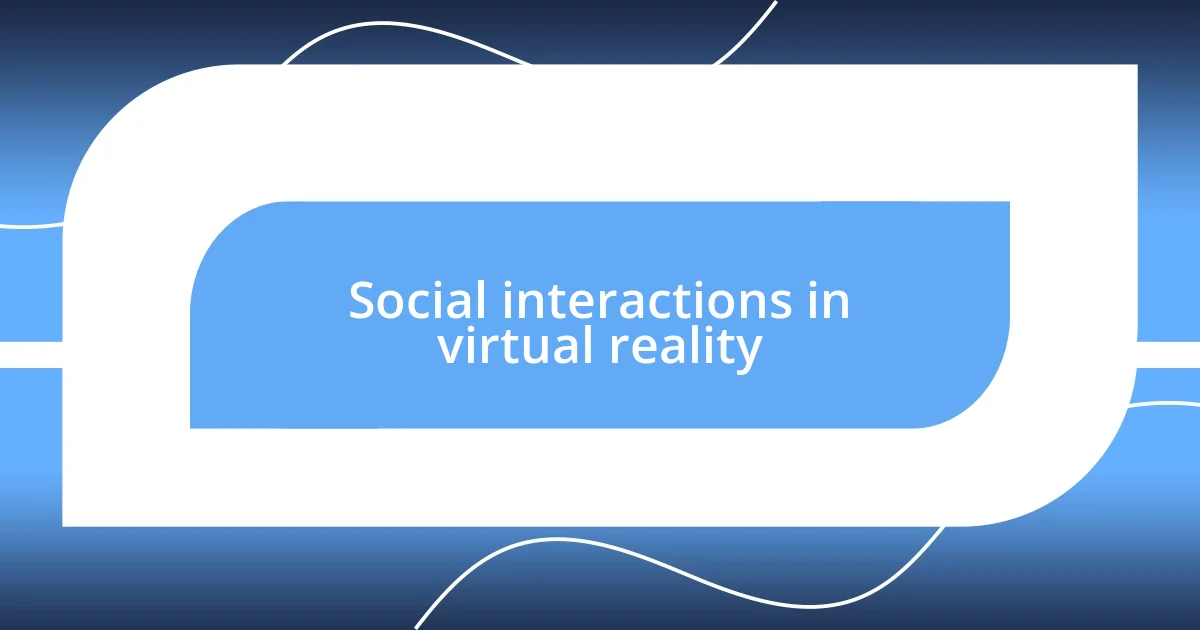
Social interactions in virtual reality
Joining friends in virtual reality can feel remarkably like hanging out in real life, albeit with a twist. I remember one evening when a group of us orchestrated a surprise party for a friend in a VR world—complete with fireworks and virtual cake! The shared laughter and excitement reminded me how technology can transform our interactions, creating bonds that genuinely feel real. Have you ever shared a moment that simply wouldn’t have been possible without the digital world?
In my experience, navigating these digital spaces requires a level of communication that emphasizes collaboration. For example, while playing a co-op adventure, we had to strategize seamlessly to defeat a challenging boss. The shared goal pushed us to plan our moves and communicate effectively, strengthening our friendship in the process. It’s like training wheels for teamwork—have you ever thought about how gaming can make you a better communicator?
What’s especially captivating is how these social experiences leave lasting impressions. I often find myself reminiscing about the jokes shared during these gaming sessions or how we cheered each other on through tough situations. Those moments not only entertain but also foster emotional connections that can carry over into our everyday lives. Isn’t it incredible how a virtual world can enhance real-life friendships so profoundly?
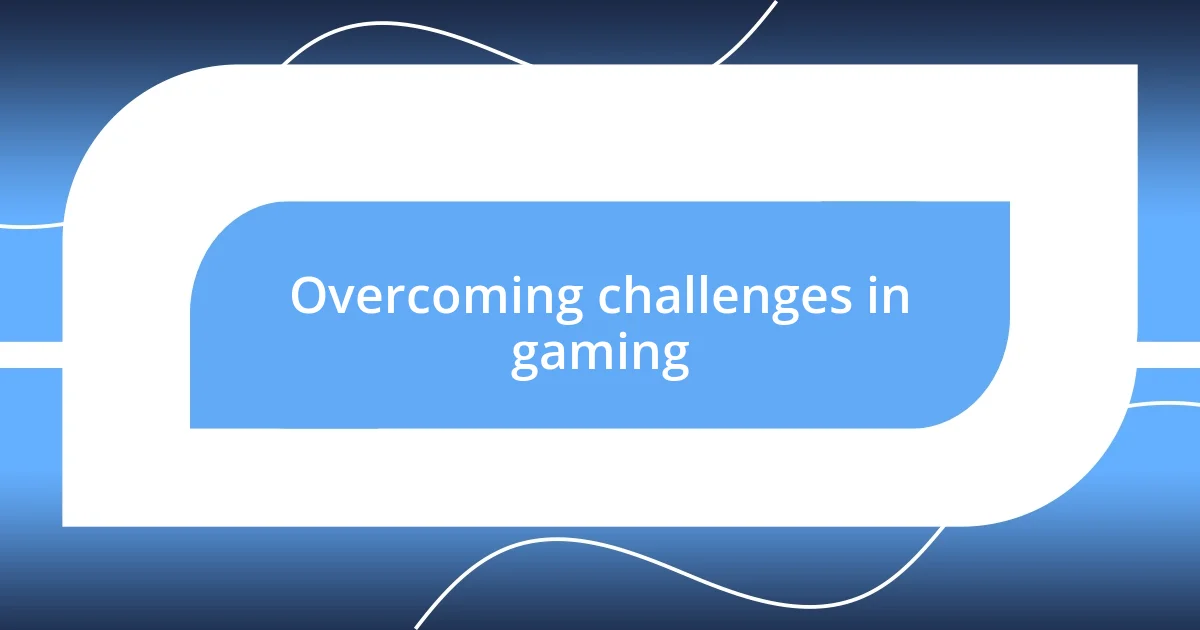
Overcoming challenges in gaming
The hurdles I faced while gaming often taught me resilience in ways I hadn’t anticipated. I vividly remember struggling for hours on a particular level in a VR platformer—every time I thought I had it down, a new obstacle would throw me off. However, with each failed attempt, I learned to adjust my strategy and keep pushing forward. This experience reminded me of how important it is to embrace setbacks as opportunities for growth. Have you ever felt that bumpy journey of learning? It’s incredibly rewarding when perseverance pays off.
In gaming, challenges often arise unexpectedly, forcing you to adapt quickly. I found that facing daunting opponents in VR often mirrored real-world stress—pushing me to think on my feet and find creative solutions. During one intense multiplayer session, I encountered a player who seemed unbeatable. As I observed their moves, I realized I could learn from their style rather than simply try to overpower them. That moment taught me the value of observation and adaptability—skills I now use in everyday challenges.
Moreover, overcoming obstacles in virtual reality has a way of building confidence. I remember finally defeating that tough level after many attempts, and the surge of satisfaction was undeniable. It’s almost surreal how a digital victory can translate to real-world self-assurance. Have you noticed how these small wins in gaming can boost your morale? Each challenge conquered not only sharpens your skills but also reinforces the belief that you can tackle whatever life throws at you.
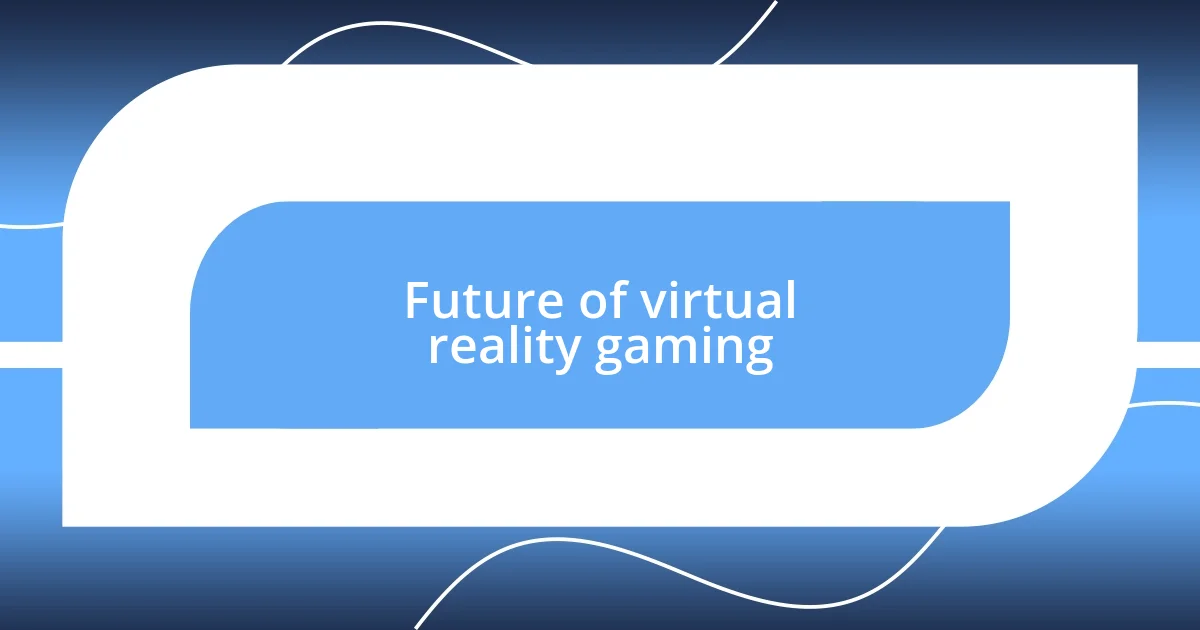
Future of virtual reality gaming
The future of virtual reality gaming is incredibly exciting, and I truly believe we’re only scratching the surface of its potential. I remember stepping into a VR environment where entire cities were simulated for exploration. The realism was astounding—like walking through a digital twin of our world. This blending of gaming with real-world elements opens up avenues for immersive experiences that are educational and entertaining. Have you ever thought about how VR could redefine learning?
As technology advances, we’re going to see more personalization in VR experiences. I recall a time when a game recommended certain challenges based on my past gameplay styles. It felt like the game knew me, almost like a good friend nudging me toward the right path. Imagine how future VR could adapt dynamically to our preferences, making each session uniquely ours! Isn’t it intriguing to think about how we might find ourselves on tailored quests designed just for us?
Moreover, the potential for social connection in future VR spaces is boundless. I envision environments where friends from around the globe can meet, collaborate, or even attend virtual concerts together. It’s like combining the magic of gaming with the feel of a global community. I think about the thrill of sharing those moments with someone across continents—doesn’t that excite you? The possibilities seem endless, and I can’t wait to see how it all unfolds.
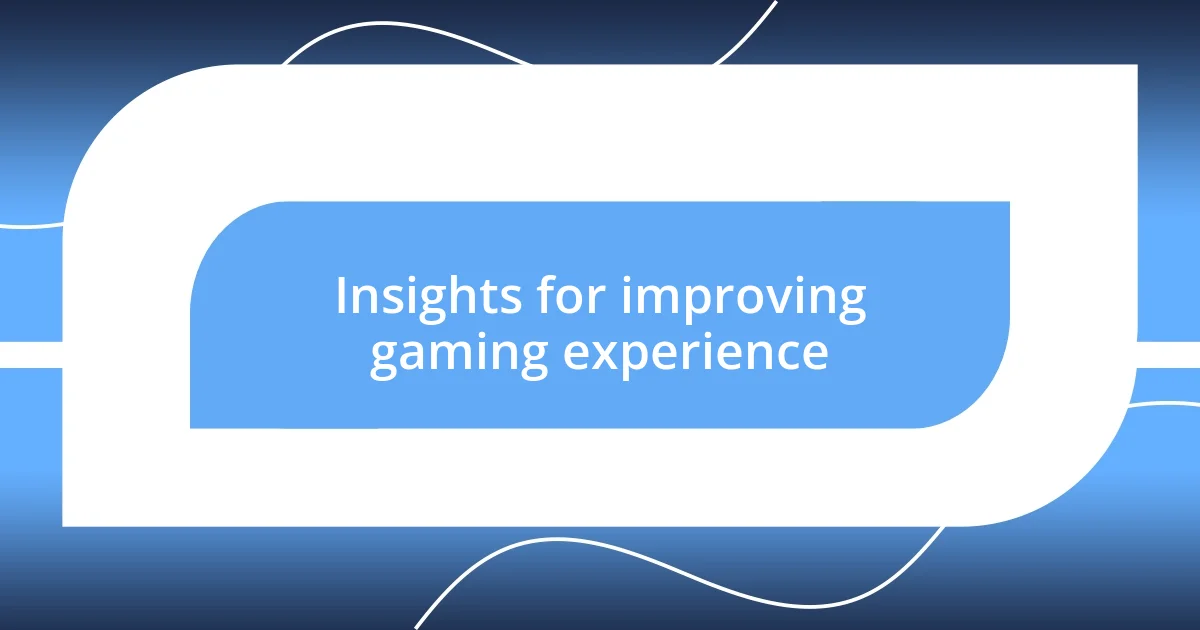
Insights for improving gaming experience
When it comes to improving the gaming experience, I’ve found that understanding the mechanics of a game can significantly enhance immersion. One evening, I spent time tweaking my settings—adjusting everything from brightness to motion sensitivity. It transformed my gameplay entirely. The colors popped, and I felt like I was really inside the game world. Have you noticed how the right settings can elevate your experience dramatically?
Another insight I gained is the importance of breaks. I remember a marathon gaming session where I stubbornly pushed through fatigue. Eventually, my focus waned, and I made silly mistakes that cost me victories. Now, I take short breaks to recharge, which not only refreshes my mind but also sharpens my performance when I return. Who would have thought that stepping away could lead to better in-game outcomes?
Lastly, engaging with the gaming community has been a game-changer for me. I recall joining a forum after feeling stuck on a puzzle. The advice and strategies I got from other players provided new perspectives that I hadn’t considered before. Sharing experiences and tips can inspire creativity and foster a deeper appreciation for the game. Isn’t it fascinating how collaboration can elevate our gameplay?












